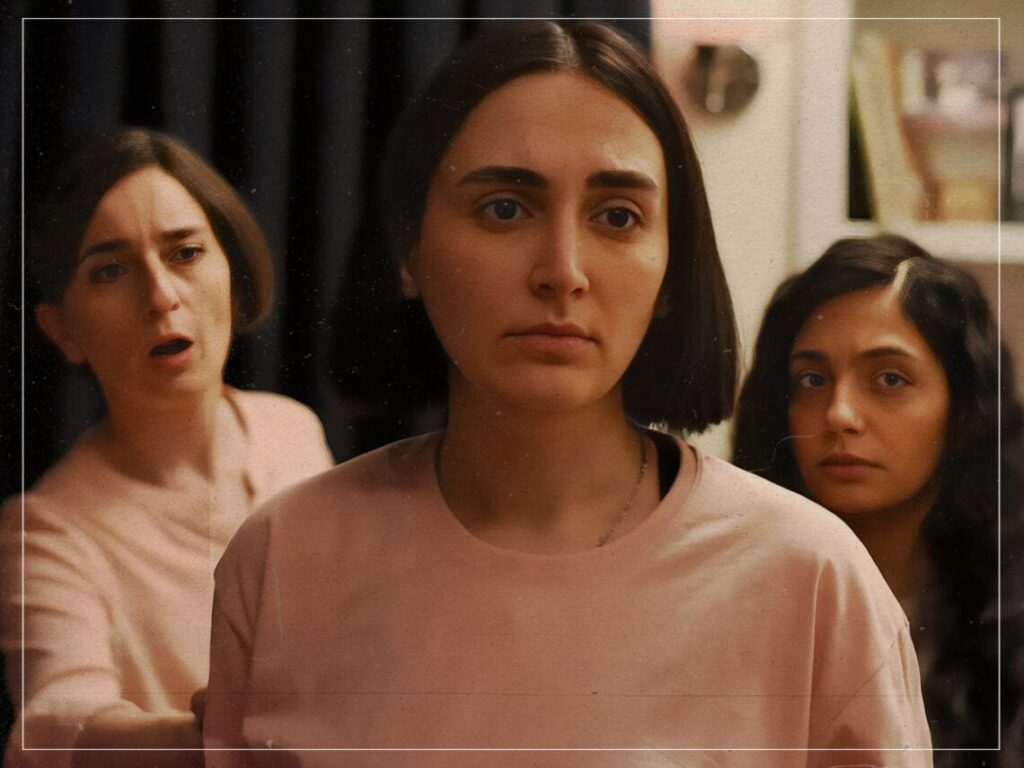‘The Seed of the Sacred Fig’ movie review: a tense mystery
 Posted On
Posted On
(Credits: Far Out / NEON)
Mohammad Rasoulof – ‘The Seed of the Sacred Fig’
Iranian director Mohammad Rasoulof’s Seed of the Sacred Fig was released under complicated circumstances. This may be indicated by the fact that it is this year’s Oscar submission, not from Iran but from Germany. In keeping with Iran’s strictness concerning artistic output, the film was banned in Iran, and its director arrested.
Rasoulof managed to escape and to smuggle a copy of the film to Europe, resulting in its being successfully screened at film festivals around the world, thanks to his German benefactors. Rasoulof, however, is permanently banished from his home country. Rasoulof has been involved with the law before, significantly for his politically-themed drama There Is No Evil, and in 2023 for criticising a government action, his incarceration preventing the widely acclaimed filmmaker’s presence on a jury at the Cannes Film Festival.
The reaction of the Iranian government alone draws attention, but Rasoulof’s film is intriguing in itself. Seed of the Sacred Fig is outwardly a family drama but one with clear political overtones, including feminist implications. The director has said the script was inspired by his experience of being interrogated while under arrest, making the family theme an interesting result.
As press releases have mentioned, Iranian books and films must address politics and social issues carefully and obliquely, often through symbolism or even poetry. Rasoulot’s script uses metaphor to deal with issues of the day, but even his metaphors are fairly direct, and some of the film’s background material is overtly political. The title is an extra bit of socio-political symbolism. The seeds of the Sacred Fig can only germinate if they are carried away by birds or insects and dropped at random on the branches of a tree. Once there, they take root and strangle the host plant. Presumably, the director expected opposition; although shot in Iran, the film itself was made entirely in secret.
The essential plot involves Iman (Missagh Zareh), a married father of two teenage daughters living in Tehran. Iman, a government lawyer, is promoted to the position of investigating judge, which involves confirming there is cause for prosecution before a trial takes place. Significantly, the film is set at the height of the recent series of protests known as the Women, Life, Freedom Uprising, which worked to reduce legal restrictions on women’s activity in Iran.
Throughout the film, images of these protests appear as background, on televised news broadcasts, in newspaper headlines, or in casual conversations, providing a largely unacknowledged theme of feminist unrest. Within the family, Iman’s wife Najmeh (actress and director Soheila Golestani) maintains a traditional household and deference to her husband, but his two daughters show signs of dissent.
The director maintains a mood of mild suspense through the first half of the film, as the complications of Iman’s job become apparent, and his daughters are urged to behave more conventionally in public, as Iman’s job demands. Vague hints of family rebellion and evidence of corruption in his department plague Iman, as do fears of his daughters being influenced by the women’s movement. The story reaches a crisis when the handgun provided to Iman by his workplace goes missing, and it appears it could only have been taken by a member of his household. From here, the storyline becomes a tense mystery and slowly escalating power struggle.
The film’s primary flaw is a lack of editing; some scenes are unduly long and detailed, and at nearly three hours long, even the more intense parts of the story feel drawn out. It is also, at times, just a bit melodramatic. An excellent cast and their portrayal of the layers of secrecy and conflict within the family sustain interest, as does the main character’s increasingly frantic struggle with disturbances in the social order and lack of control. The mystery of which of the three females in the household may be a secret disruptor and her possible reasons also keep things interesting. The parallels between personal and political are nicely done, allowing the two to finally become indistinguishable. As the director’s prosecutors would agree, it is a film that makes a point.
[embedded content]
Related Topics


